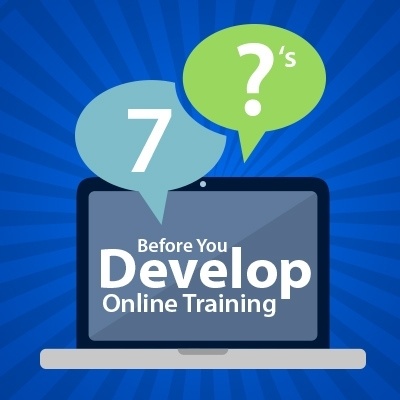Questions To Ask About Your Learners Before You Develop Online Training
Your learners should be your first priority when you begin to develop online training courses. Keeping the details of your learners’ unique backgrounds and learning styles in mind will create a better learning experience and lead to a successful e-Learning course.
As an e-Learning developer, creating a learning experience tailored to your audience will produce an environment where learners absorb, comprehend and retain critical information at the greatest level. Before you sit down to start developing your next e-Learning masterpiece, ask these 7 simple questions about your learners:
- What are the skill levels of your learners?
Think about whether your learners are intermediate or novice, advanced or somewhere in between in relation to the online training topic. This will allow you to tailor your language, instructions and interactivity in a way that will help the learner succeed in comprehending the course material. If the course includes technical terms that the learners may not be familiar with, consider including a glossary to provide definitions. - Are your learners familiar with online courses?
Keep in mind that all your learners may not be familiar with taking online courses. For your learners that may need guidance, create an optional tutorial that will show how to navigate and complete the training course. - What technologies will they need to take your online course?
Determine how your learners will access the course and consider all of the restrictions. For example, your learners may have firewall restrictions that will not allow them to access the course. Check with an IT professional to confirm that your course will be easily accessible to all learners. - Where will your learners likely take your course?
Consider if your course will be accessed on-the-go or on a desktop. If your content is more performance support based and may need to be accessed any time, anywhere—mobile may be your best option. If your course is very interactive, dynamic and information heavy, a desktop version will be your best bet. - How much time will your learners need to complete the course?
This will help you decide how you should divide your content depending on whether your learners will progress through the course over an extended period time or if they will move at a more rapid pace for a quick completion. - What language do the learners speak?
If your learners are multilingual, you will need to be aware of the examples you use and the content you include to make sure all learners will fully understand your course. Consider creating localized content for any of your learners who speak a different language. - What industries do your learners work in?
If your learners work in a particular industry, you can incorporate specific jargon and terms in your e-Learning course.. If your learners work in different fields, make sure you keep the industry-specific terminology to a minimum.
Even if you do not have all the answers to these questions, you can still make a quality judgment and customize your training to best fit the needs of your learners. This will help learners more fully understand the content and reach your training objectives. If you are looking for guidance while developing your course, Lectora® e-Learning software has lots of great free resources in Lectora University to help you! Looking to create training for learners on-the-go? Check out this designer's guide on how to build your course for an iPad. The e-Learning experts at Lectora also offer plenty of sample courses that may help spark inspiration!






